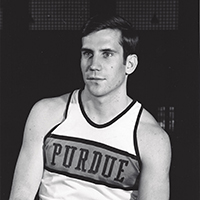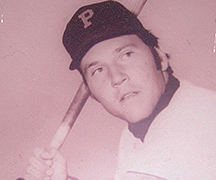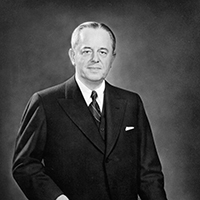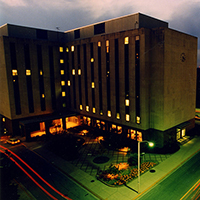 Krannert's alumni network includes numerous student-athletes who went on to professional careers in fields other than their chosen sport. (Photo by iStock)
Krannert's alumni network includes numerous student-athletes who went on to professional careers in fields other than their chosen sport. (Photo by iStock)
Game On
Former student-athletes find professional success in diverse fields
Most Purdue athletes will tell you that the demands of Big Ten competition alongside academics require fierce discipline when it comes to time management. Coupled with the particular challenges of obtaining a management degree, Krannert student-athletes also develop a blueprint for leadership, teamwork and career success in a surprising variety of fields.
With the exception of college baseball players, some of whom join a farm system that could lead to a spot on a Major League roster, the NCAA estimates that less than 2 percent of its athletes turn professional. So within the relatively short window of playing eligibility, the most forward-thinking players make the most of classroom and study time.
Here, you'll meet six Krannert alumni who were student-athletes at Purdue: two trackmen, a soccer player, a baseball player, a basketball player and a volleyball player. Each of them, at one time or another, balanced busy schedules and team leadership demands with a rigorous Krannert course load and a focus on success beyond the arena of sports. Their career outcomes, although still in the making, show the range of a Purdue management degree — from working in a courtroom or operating room to industry, health care and higher education.
Rocket science to brain surgery

No one could ever accuse Richard Roski of padding an academic schedule on his path from Big Ten runner to chief of neurosurgery at Cleveland Clinic Florida. Roski (Engineering ’71, MSM ’90) first came to Purdue as a two-miler from Ohio who would run the mile as a Boilermaker. He majored in engineering sciences in the heyday of the U.S. space program.
Having arrived in the late 1960s at a tumultuous time on college campuses, Roski says his demanding engineering studies and track and field training gave him something to focus on. He met Purdue astronauts Neil Armstrong and Eugene Cernan and developed the analytical and problem-solving skills of an engineer.
Within his sport, he relished the team competition that pitted the individual against the field in his event. “It’s about rising to the occasion,” says Roski, who was coached by Dave Rankin, a Purdue Hall of Famer. “I think track helps develop character and your ability to deal with different situations.”

The pull to medicine and Case Western Reserve University, where he earned his MD in 1976, came from Roski’s desire to help people directly. He returned to Purdue and the Krannert School of Management a dozen years later after establishing his practice in Iowa. Through two-week stints, Roski studied alongside corporate businesspeople.
“This was a very intelligent, motivated group,” Roski says of his Krannert classmates. “The people in the class really knew their stuff and the professors enjoyed teaching students with that much experience.”
A better understanding of spreadsheets and finances helped Roski better run his business, which continued to flourish. Then, after 25 years in Iowa, he left to help build a neurosurgery program in Florida.
Brain surgery often presents life-and-death challenges in short time frames. Being on call and quickly stepping into emergency situations is commonplace. “There’s a lot of pressure in that,” he says. “I’ve been doing this for a long time, but it still keeps me on my toes.”
That literal footwork sometimes involves 16-hour marathon procedures. “Surgery is a very physical profession. You’re often doing long cases with a lot of intense work. The track conditioning alone is actually a pretty good background,” says Roski, who has turned in running shoes (after some knee issues) to become a competitive Masters swimmer.
Quick bat with a head for numbers

James “Jamie” Pratt (BSIM ’73) once hit a walk-off home run at Ohio State that he can still feel and see today. A rising rope of a line drive, it was only a matter of the ball being fair or foul. “It stayed fair and we won the game,” says Pratt, now a professor of accounting at Indiana University’s Kelley School of Business.
That perfect contact of bat on ball in a game known for its failures is what Pratt loves about baseball, where a .300 hitter (that’s 70 percent failure) makes an all-star team. As the Alva L. Pickett Chair, which honors his research prowess, Pratt brings the same tenacious persistence to academia that he brought to the batter’s box.
From Bishop Chatard High School in Indianapolis, Pratt chose Purdue more for its academic options and proximity to home than its baseball program. He even played basketball his freshman year, but tired of running into practice picks set for Rick Mount, perhaps the all-time greatest Boilermaker shooter. After a good college career as a center fielder, Pratt was drafted by the Chicago White Sox and played one summer in the Cape Cod league. Eventually, though, he knew he would have to hang up his spikes.
Early on, odds didn’t look good for an accounting future. Pratt thinks he earned a C+ in his very first accounting class — a large class with an 8 a.m. meeting time. Later, Jack Helmkamp, a professor of accounting, helped Pratt get inside the numbers better and spark his interest in the academic lifestyle.
Pratt enrolled in the MBA program at Indiana University but switched over to the PhD program after showing great classroom promise as a teaching assistant. After earning his doctorate in 1977 — followed by academic posts at the University of Washington and Northwestern, and a few one-year stints abroad — he returned to Bloomington in 1990.
“In an academic world there are two things that you’re supposed to do. You create knowledge and then transfer it,” Pratt says. “The creation is what we call research, and the transfer is what we call teaching. Research is very challenging, but also very rewarding when you publish work in journals. At the same time, teaching is a blast. It’s getting in the classroom with active students and motivating them to learn a topic that’s not easily understood.”










